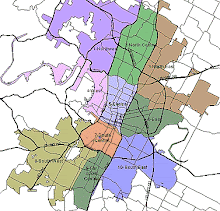
There are multiple Austins, but there are two which stand out more than any others: Poor Austin and The Rest Of Austin. In Poor Austin, there are no bank branches nearby, forcing residents to drive/bus elsewhere lest they fall prey to predatory banking practices like payday loans and check cashing fees. Grocery stores are distant, and smaller "local" stores rarely have fresh produce and what families need to stay healthy and without diabetes. Poor Austin residents, who can barely afford to pay rent, must make car payments because the neighborhoods are designed for reliance on cars. It rarely matters in Poor Austin that the residents be educated: there are few opportunities for a skilled workforce in jobs that pay actual wages, and such a stigma on location that educated people can barely keep businesses afloat when located in Poor Austin. Low wages for younger, newer residents make homeownership and home maintenace distant dreams. Political participation? Forget it, not with working multiple jobs (all of which are inflexible about time off), no cars, and no daycare facilities.
This is the Poor Austin story that many residents of The Rest Of Austin fail to understand. Hate those developers? Well, if developers build in East Austin, most of their workers would be closer to homes and families. Mad at the rise in taxes? At least there are more jobs in The Rest Of Austin which can support more of that rise, as opposed to the retail/food service jobs for barely more than minimum wage with no benefits in Poor Austin. Annoyed at the rise in CapMetro rates? A bunch of folks would enjoy having more money instead of throwing it into their cars they can barely afford. Unfortunately, The Rest Of Austin would rather speak for Poor Austin rather than actually listening to it.
We need more diverse income groups in Poor Austin neighborhoods for a number of reasons. First of all, people who make more money can afford to care more about their neighbors and neighborhoods, so crime is more difficult. After all, more wealthy people are working from home, so they probably want to be comfortable in their homes/offices. Secondly, trained and educated citizens - or at least citizens who graduated from high school - help eradicate the notion that being uneducated is some sort of "rebellion against the system" and therefore helpful for social growth. Diverse incomes generally encourage the introduction of handy things like banks, medical clinics, frequent transit routes and smaller, healthier grocery stores within walking distance. Lastly, neighborhoods with more diverse incomes generally have some people who can attend meetings, giving voices to communities which have been shut out simply be
 cause they are far from public forum locations or work too much.
cause they are far from public forum locations or work too much.Posting inspired by:
